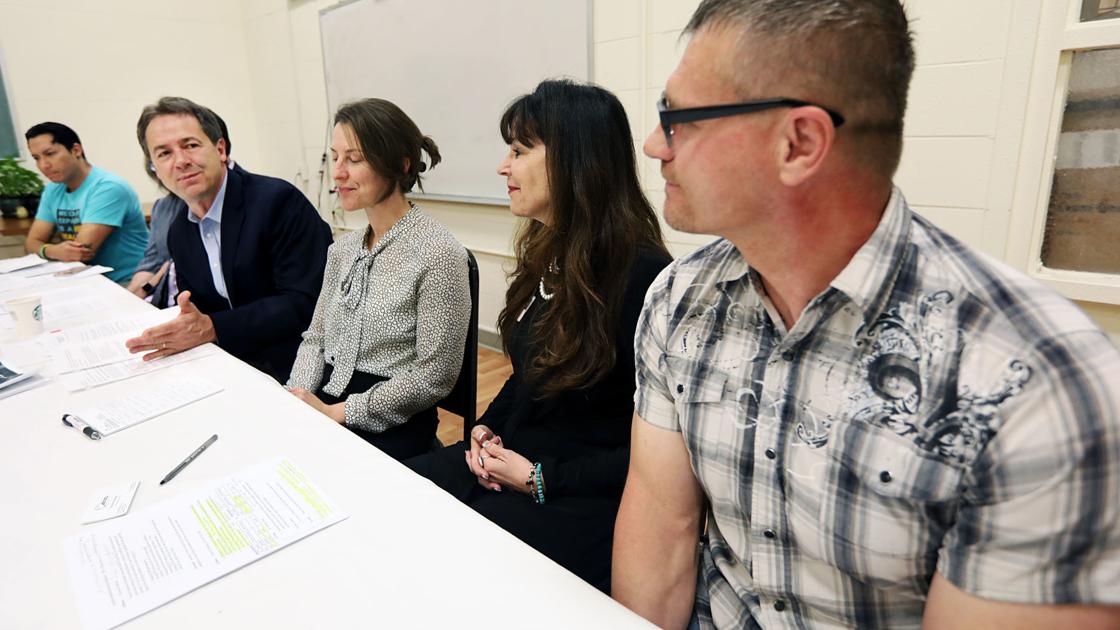Gov. Steve Bullock touts new study in Butte that shows benefits of Medicaid expansion

Shane Park, 49, got released from parole on Oct. 2, 2017. By Oct. 5, he was using methamphetamine again.
That’s the story Park told before a small group who gathered at the Southwest Montana Community Health Center to participate in Gov. Steve Bullock’s roundtable on Medicaid expansion, which is set to sunset in 2019. The roundtable included several medical professionals in Butte, including Jennifer Malone and Dr. Shawna Yates, who together run the center, and Jay Doyle, president of St. James Healthcare.
Park’s story of 32 years of methamphetamine addiction and how it ruined his life until he sought help last fall created a prime example for the roundtable of some of the benefits of Medicaid expansion. Park developed health problems last fall and told The Montana Standard after the meeting he thought he was going to die if he didn’t seek medical attention.
The Southwest Montana Community Health Center encouraged him to begin mental health help and to seek addiction treatment. Park wouldn’t have gotten the aid he needed without Medicaid, which covered his treatment, he said.
Drug-free since January of this year, Park is working, volunteering, and participating in various recovery programs to keep himself sober.
"I've felt better than I've felt in 35 years," he said. "I don't want that shame and guilt anymore."
Bullock’s visit to Butte was part of a larger effort he and Lt. Gov. Mike Cooney are making across the state to talk about the economic and health benefits of Medicaid expansion for Montana.
The Legislature passed the Health and Economic Livelihood Partnership Act in 2015. But in a compromise between Bullock and Republicans, the HELP Act got a four-year trial run, unless the Legislature is willing to extend it next year.
State Sen. Edward Buttrey, R-Great Falls, has said publicly he will not support the measure in 2019, saying the act costs Montanans too much. Buttrey supported the bill in 2015.
Buttrey did not respond to a request for comment.
Another option for Bullock is a ballot initiative — I-185 — which would make the expansion permanent. Under the initiative, the HELP act would be funded by a tobacco tax that would raise the price of a pack of cigarettes by $2.00. Backers of the initiative — which include The Montana Hospital Association, Montana Medical Association, and Montana Primary Care Association — need 25,000 signatures to get it on the ballot.
According to Bullock and other speakers at the roundtable, there are good reasons to keep HELP going.
A report released this month by the Bureau of Business and Economic Research at the University of Montana-Missoula states that Medicaid expansion added 3,161 jobs, $147 million in personal income, and $336 million in new sales to Montana’s economy in 2016.
If the Medicaid expansion continues with the current level of enrollment in Montana, the report estimates it will bring $350 million to $400 million of new spending to the state’s economy each year. That in turn would generate around 5,000 jobs and $270 million in personal income each year from 2018 to 2020.
There are health benefits, too. Nearly 94,000 Montanans have enrolled since 2015, and uncompensated care for hospital visits declined by more than 45 percent from 2015 to 2016, according to the report.
Montanans who might not be able to afford care and skip out on it fell by 16 percent within the first year of the HELP act.
According to the report, the Department of Corrections had to seek medical care for inmates through Blue Cross/Blue Shield prior to the HELP act’s passage. But once the expansion program was in place, the DOC reduced its spending on health care by $7.66 million in 2017.
Bullock said the Medicaid expansion plan helps working Montanans who "are working hard to make ends meet." One restriction Republicans have floated is that the program require Medicaid recipients to work.
The current expansion program comes with some strings attached already. Enrollees have to pay 2 percent of their income in premiums, and they can be dis-enrolled if they fail to pay.
Bullock also said that without the expansion, the money that comes from the federal government would go to other states.
"It gets more people in the work force," Bullock told the Standard. "People shouldn't have to live from health care emergency to health care emergency."
Tidak ada komentar